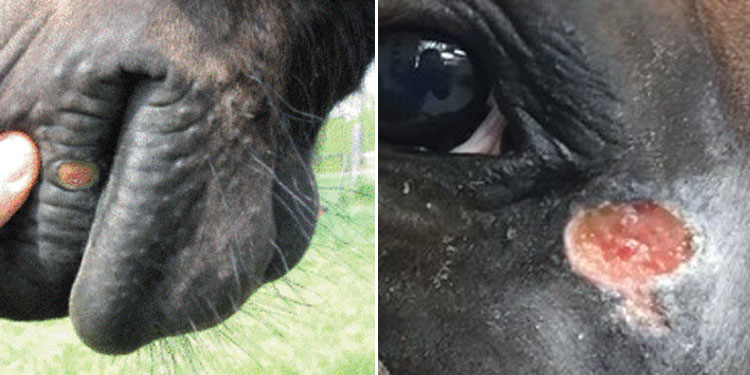By Daniel H. Grove, DVM

Summer sores are a big problem for horses in climates that are warm and moist. We discussed them a few years ago, but I think it is time to revisit them. I am seeing them very frequently, and so are many other practitioners. Let’s delve into what they are, some treatment strategies and prevention.
Habronema and Draschia are the names of the nasty little parasites that causes this sometimes-challenging-to-deal-with disease. They are two of the stomach worms of horses. and in their normal life cycle, do not seem to cause much harm. When the parasite gets deposited in an area of the skin or other external area, they can wreak havoc. They cause a non-healing wound that often times increases in size. It can be bordered by a layer of scar tissue that makes it challenging to get drugs to the source of the problem to kill them off. Often times, small granules are associated with the lesions. If in doubt, a simple biopsy of the lesion can often diagnose the problem. This can be an important part of the diagnosis, as some lesion can mirror other problems.
The most common places I see them are:

So, how do we treat them? Often times, the animal needs to be dewormed; ivermectin products work well. Your veterinarian will have to assess the best course of action based on location. Ones in the area of the eye, often times need to be manually removed. This can be a tedious process and may require multiple debridement sessions to get all of the granules. Ones that are on the skin often times need to be debrided to remove the majority of the lesion or even the entire lesion if possible. Whichever treatment is done, often times for me a combination of deworming, debridement and topical medication yield the best results.
While treatment will most likely require assistance from your veterinarian, prevention is always something the owner can participate in. Ways you can prevent this nasty infection are:
Hopefully, you never have to deal with one of these. But if you do, do not wait. They can grow very rapidly in just a few days. Many times, I get clients say they were treating this and just a few days ago, it was a small little insignificant wound that has blown up overnight. If you are not sure, get your veterinarian out to help you decide if you have a Summer Sore!
–Dan
Leave a Comment
All fields must be filled in to leave a message.